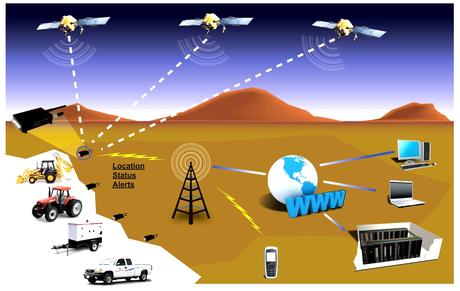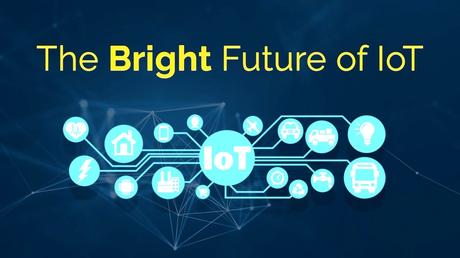Exploring the Power of Industrial IoT WIFI: Revolutionizing Connectivity. We will delve into its applications, benefits, and impact on industries. Explore the future of connectivity.
Introduction
In our ever-evolving digital landscape, One that has changed the game is the Industrial Internet of Things (IoT), redefining how industries operate. At the heart of this technological transformation lies Industrial IoT WIFI, a powerful tool that is revolutionizing connectivity across various sectors. This in-depth tutorial will examine the significant impact of Industrial IoT WIFI, its applications, benefits, and its promising future.
The Foundation: Power of Industrial IoT WIFI

Industrial IoT WIFI serves as the cornerstone of the digital revolution in industries. It’s more than just a wireless connection; it’s a catalyst for innovation, streamlining processes, and enhancing efficiency.
Enhancing Connectivity
Industrial IoT WIFI seamlessly connects a multitude of devices and sensors within an industrial ecosystem. From machinery on factory floors to environmental sensors in remote locations, it brings everything together, fostering real-time data exchange.
Empowering Remote Monitoring

With Industrial IoT WIFI, remote monitoring has become a reality. Industries can now oversee operations in distant or hazardous environments, improving safety and optimizing resource allocation.
Read more: EMR’s Impact on IoT Technology
Facilitating Data Analytics
The treasure trove of data generated by Industrial IoT WIFI is a goldmine for industries. Advanced analytics unlock insights that drive informed decision-making, leading to improved productivity and cost efficiency.
Applications Across Industries

The power of Industrial IoT WIFI transcends boundaries, finding applications in a diverse array of industries. Here are some notable examples:
Revolutionizing Manufacturing
In the manufacturing sector, Industrial IoT WIFI optimizes production lines. Sensors provide real-time data on equipment performance, reducing downtime and ensuring quality control.
Industrial IoT WIFI has ushered in a new era for manufacturing. In the past, factories relied on manual labor and periodic equipment maintenance, leading to inefficiencies and production downtime. However, with the implementation of Industrial IoT WIFI, manufacturing has become smarter and more efficient.
This technology enables the real-time monitoring of equipment and processes. Sensors placed on machines collect data on parameters like temperature, pressure, and performance. This data is then transmitted wirelessly, allowing engineers and managers to monitor the production line remotely.
The benefits are substantial. Predictive maintenance, made possible by Industrial IoT WIFI, helps identify potential issues before they lead to costly breakdowns. This not only reduces downtime but also extends the lifespan of machinery, resulting in significant cost savings for manufacturers.
Additionally, quality control receives a substantial boost. Sensors can detect anomalies in the production process, ensuring that products meet strict quality standards. This leads to higher-quality products and increased customer satisfaction.
Agriculture
Precision agriculture relies on Industrial IoT WIFI to monitor soil conditions, weather patterns, and crop health. This data-driven approach maximizes yields while conserving resources.
In agriculture, the adoption of Industrial IoT WIFI is transforming the way crops are cultivated. Precision agriculture, as it’s known, significantly relies on data to guide its planting, watering, and harvesting operations.
Industrial IoT WIFI facilitates the deployment of sensors in fields. These sensors collect data on soil moisture, temperature, and nutrient levels, among other things. This data is transmitted via WIFI to a central system where it’s analyzed to make data-driven decisions.
Farmers can optimize irrigation schedules, ensuring that crops receive just the right amount of water and reducing water wastage. This not only conserves a precious resource but also lowers operational costs.
Furthermore, data-driven insights enable farmers to make better decisions about crop rotation, planting times, and even pest control. The result is higher crop yields and more sustainable farming practices.
Health and Healthcare

In healthcare, IoT WIFI transforms patient care. Wearable devices and smart healthcare infrastructure enable remote patient monitoring and timely interventions.
In healthcare, Industrial IoT WIFI is revolutionizing patient care. Imagine wearable devices that continuously monitor a patient’s vital signs and transmit this data to healthcare providers in real time. This is now a reality, thanks to Industrial IoT WIFI.
Patients with chronic conditions, such as diabetes or heart disease, can benefit immensely from this technology. Doctors can receive alerts if a patient’s condition starts to deteriorate, allowing for early interventions.
Moreover, Industrial IoT WIFI enhances the management of healthcare facilities. It can monitor the availability of essential medical equipment, such as ventilators, and ensure that they are in proper working condition. This proactive approach to maintenance can be life-saving in critical situations.
Read more: Revolutionizing Healthcare with IoT Applications
Energy Efficiency
In the energy sector, Industrial IoT WIFI plays a pivotal role in smart grid management. It enhances the reliability of power distribution while promoting energy conservation.
The energy sector is also experiencing a transformation through Industrial IoT WIFI. Smart grids, which rely on this technology, enable more efficient energy distribution. With real-time data on energy consumption and grid performance, utilities can optimize energy delivery, reducing wastage and ensuring a stable power supply.
Furthermore, Industrial IoT WIFI allows in order to manage renewable energy sources like solar and wind more effectively. These sources can be intermittent, making their integration into the grid challenging. However, with precise data on their output and weather conditions, adjustments can be made to ensure a reliable energy supply.
Transportation Gets Smarter

IoT WIFI is reshaping transportation systems, from intelligent traffic management to predictive maintenance for vehicles, ensuring smoother and safer commutes.
Industrial IoT WIFI is reshaping transportation systems worldwide. From traffic management to vehicle maintenance, this technology is enhancing the safety and efficiency of transportation.
Traffic management systems powered by IoT WIFI can monitor traffic flow in real time and adjust signal timings accordingly. This reduces congestion, lowers fuel consumption, and minimizes travel time for commuters.
Additionally, predictive maintenance for vehicles is becoming a reality. Sensors in cars can transmit data about engine performance and wear and tear. Mechanics can then schedule maintenance before a breakdown occurs, saving drivers from unexpected repair bills and ensuring safer journeys.
In conclusion, Industrial IoT WIFI is the driving force behind the fourth industrial revolution. It’s changing the way industries operate, making them more efficient, cost-effective, and sustainable. More developments are likely to come as this technology develops and applications that will shape the future of connectivity across various sectors.
Benefits Galore

The adoption of Industrial IoT WIFI translates into a multitude of benefits for industries:
Maximum Efficiency and Productivity
One of the standout advantages of Industrial IoT WIFI is its ability to maximize efficiency and productivity across industries. Here’s how:
- Real-time Data: Industrial IoT WIFI enables the continuous collection of real-time data from various devices and sensors. This data offers invaluable insights into equipment performance, process optimization, and resource allocation.
- Predictive Maintenance: By analyzing data from sensors, industries can predict when machinery and equipment are likely to fail. This allows for proactive maintenance, reducing unexpected downtime and costly repairs.
- Process Optimization: With a wealth of data at their disposal, industries can fine-tune their processes for optimal performance. This not only boosts productivity but also ensures consistent product quality.
- Resource Allocation: Real-time data helps in optimizing the allocation of resources such as energy, materials, and labor. This leads to significant cost savings and minimizes waste.
Read more: What is Industrial Metaverse of Microsoft
Enhanced Safety
Industrial IoT WIFI plays a pivotal role in enhancing safety within industrial settings. Here’s how it achieves this:
- Remote Monitoring: Industries can remotely monitor hazardous environments or equipment, reducing the risk to human workers. This is particularly crucial in industries like mining, where safety is a top concern.
- Emergency Alerts: Sensors can detect safety hazards or anomalies and trigger immediate alerts. This ensures swift responses to critical situations, mitigating potential disasters.
- Compliance Monitoring: Industries can use IoT data to monitor compliance with safety regulations. This helps in avoiding fines and ensuring a safe working environment.
Sustainability
In an era where sustainability is paramount, Industrial IoT WIFI contributes significantly to environmental and economic sustainability:
- Energy Efficiency: Industrial IoT WIFI helps in optimizing energy consumption by monitoring and controlling the use of energy-intensive equipment. This reduces energy bills and carbon emissions.
- Resource Conservation: In agriculture, precision farming made possible by IoT WIFI minimizes water and fertilizer usage, conserving resources and reducing the environmental impact.
- Waste Reduction: By optimizing processes and reducing inefficiencies, Industrial IoT WIFI helps minimize waste production, promoting eco-friendly practices.
Cost Savings
Cost reduction is a key benefit of Industrial IoT WIFI, affecting various aspects of operations:
- Maintenance Costs: Predictive maintenance, driven by IoT data, reduces the frequency of unplanned equipment breakdowns and costly repairs.
- Labor Costs: Automation and process optimization often lead to a more efficient workforce, reducing labor costs.
- Inventory Management: Real-time data allows for better inventory management, reducing carrying costs and minimizing stockouts.
- Energy Savings: Energy-efficient operations driven by Industrial IoT WIFI lead to substantial savings on energy bills.
Quality Control
Quality control is paramount across industries, and Industrial IoT WIFI helps maintain high product and service standards:
- Continuous Monitoring: Sensors provide continuous monitoring of product quality, ensuring that products meet stringent standards.
- Data-Driven Decisions: Data analytics from IoT sensors help in identifying deviations from quality norms and making immediate adjustments.
- Traceability: Industries can trace the entire production process, making it easier to identify and rectify quality issues.
In essence, Industrial IoT WIFI offers a multitude of benefits that span efficiency, safety, sustainability, cost savings, and quality control. It’s not just technological innovation; it’s a transformative force that empowers industries to thrive in an increasingly competitive and complex world.
A Bright Future of Industrial IoT WIFI

The future of Industrial IoT WIFI is undoubtedly promising. As technology advances at an astonishing rate, we can only anticipate more innovative applications and benefits. Here are some exciting developments on the horizon:
1. 5G Integration:
The integration of Industrial IoT WIFI with 5G networks will result in even faster and more reliable connections. This is particularly significant for applications that require real-time data transmission, such as autonomous vehicles and smart cities.
2. Edge Computing:
Edge computing, combined with Industrial IoT WIFI, will allow for data processing closer to the source. This reduces latency and ensures rapid decision-making, which is crucial for applications like autonomous machinery and augmented reality.
3. Enhanced Security:
Cybersecurity will continue to be a top priority. Advanced encryption techniques, multi-factor authentication, and biometrics will fortify the security of Industrial IoT WIFI systems, safeguarding sensitive data.
4. Industry-Specific Solutions:
As the technology matures, we can expect industry-specific solutions to flourish. Whether it’s predictive maintenance algorithms tailored for a particular sector or healthcare wearables designed for specific conditions, customization will be key.
5. Environmental Sustainability:
Industrial IoT WIFI will be essential to accomplishing environmental sustainability objectives. Smart grids will further reduce energy waste, and precision agriculture will minimize resource consumption, contributing to a greener planet.
6. Improved Accessibility:
As costs decrease and technology becomes more accessible, small and medium-sized businesses will increasingly adopt Industrial IoT WIFI solutions. This democratization of technology will drive innovation across industries.
7. Global Connectivity:
Industrial IoT WIFI has the potential to connect remote and underserved regions worldwide. This can bridge the digital divide, bringing education, healthcare, and economic opportunities to previously isolated communities.
In essence, Industrial IoT WIFI is at the forefront of a digital revolution that transcends industries and borders. Its potential to drive efficiency, sustainability, and connectivity is boundless, making it a critical component of our rapidly evolving technological landscape.
FAQs
Q: How does Industrial IoT WIFI differ from traditional WIFI?
A: Industrial IoT WIFI is designed for the specific needs of industries, offering enhanced security, reliability, and scalability compared to traditional WIFI.
Q: What are the security implications of Industrial IoT WIFI?
A: Security is a top priority. Industrial IoT WIFI employs robust encryption and authentication measures to safeguard data integrity.
Q: Can small businesses benefit from Industrial IoT WIFI?
A: Absolutely! Industrial IoT WIFI is scalable and adaptable, making it suitable for businesses of all sizes.
Q: Are there any privacy concerns with the use of Industrial IoT WIFI?
A: Privacy is a valid concern. However, strict data governance and compliance measures are in place to protect individual privacy.
Q: How does Industrial IoT WIFI contribute to environmental sustainability?
A: By optimizing resource utilization, Industrial IoT WIFI helps reduce energy consumption and waste, aligning with sustainability goals.
Q: What is the future of Industrial IoT WIFI?
A: The future is promising, with continuous advancements in technology and wider adoption across industries, further enhancing connectivity and efficiency.
The power of Industrial IoT WIFI is not just a technological marvel; it’s a transformative force that is reshaping industries, driving efficiency, and propelling us toward a more connected and sustainable future. As we explore the potential of Industrial IoT WIFI, we find a world of possibilities waiting to be unlocked.
Conclusion
In this exploration of the power of Industrial IoT WIFI, we’ve uncovered its transformative impact on various industries. From revolutionizing manufacturing and agriculture to enhancing healthcare and transportation, this technology is driving innovation across the board.
As we look to the future, the possibilities are endless. With advancements in 5G integration, edge computing, and enhanced security, Industrial IoT WIFI is poised to continue reshaping industries and improving our lives. Its potential to promote sustainability and accessibility ensures that it will play a vital role in building a more connected and prosperous world.
In conclusion, Industrial IoT WIFI is not just a technological advancement; it’s a beacon of progress, promising a brighter and more connected future for us all. Embracing this technology and staying attuned to its developments will be key to thriving in the digital age.
